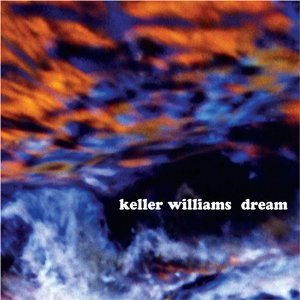Keller
Keller Williams’ Dream Team Shoots – and Scores!
By Dean Budnick
Our story begins with Keller Williams’ Youth. No, not his adolescence (although presumably that’s essential to the mix) but rather a studio recording of that name, which Williams began in February 2004. He assembled a number of songs thematically linked around this title, with the intention of releasing them on a disc that would feature a painting of his infant daughter as cover art. In reaction to the cloistered Home cooking of his prior recording, in which he played all the instruments, this time Williams asked for help.
Initially he tapped Jeff Covert of Wally Cleaver’s Recording Studio (who had engineered Home) to contribute drums and guitar. But as Keller considered the material he wished to record, he began to hear some of these songs with other voices. Although he typically goes it alone in the live setting, the concept of drawing in additional players to the studio context was not altogether novel to him, as Williams had recorded Breathe (1999) with The String Cheese Incident and Laugh (2002) with Dave Watts and Tye North. This time he decided to vary the palette, by inviting an increasing number of his musical heroes to participate. The pursuit of his Dream team absorbed him for over two and half years and carried Williams along a path that eventually would land him on Bob Weir’s doorstep, where the two of them would entwine their voices to sing of a Cadillac populated by Allah, Buddha, Hari Krishna and Jesus “riding in the bitch seat, cause he’s good like that.”
Oh yes, Santa Claus is in there as well, likely the object of Williams’ gratitude, given the musicians who ultimately assented. In early 2002, when asked to name the contemporary musicians that he most admired, Keller’s list included Bela Fleck, Charlie Hunter, Martin Sexton, Victor Wooten and The String Cheese Incident, all of whom appear on the disc that came to be called Dream, to reflect its new direction.
One possible peril of producing a studio recording with over 30 participants is that while the individual tracks might shimmer, when taken as a whole the disc might lack a unity and flow.
“I never put that much thought into stuff,” Williams laughs. “I didn’t go very far in college and my whole life doesn’t really revolve around that type of thinking. Too much theorizing on one thing can be bad, I guess. I was just hoping that it would be something that I’d be proud of. So I was shooting big, going as big as possible for certain things and wondering with giddiness what that might sound like with certain heroes of mine playing these things – the whole mystery of what that would sound like.”
In some cases, the mystery extended to the artists themselves. Fareed Haque (Garaj Mahal), who appears on the instrumental “Cookies,” recalls, “It was real exciting because Keller was so open and encouraging. He said, ‘I’m going to send the track with my guitar part and I want you to do whatever you want to do.’ And when the track showed up, I was thinking, ‘Is there a vocal missing or is something missing here? Does he just want me to add a guitar?’ So I called him up and he told me that he basically wanted me to invent a track, to go ahead and compose alongside his composition. That’s pretty amazing, because most artists tend to be more controlling and he was all about the spirit of it being an actual collaboration. So I think I played 19 or 20 guitar parts and then he went back and did more stuff to it as well.”
Williams utilized a number of methods to realize his Dream. In some instances, he shared a studio with his participants (or, as was the case with Michael Franti, a makeshift studio: Franti recorded some of his vocals for “Ninja of Love” on the back of a tour bus). In other cases, he mailed the tracks to the artist ( “I wasn’t stupid enough to believe I could get all these people in a room at one time. But I was really getting into recording in this local studio, watching the whole Pro Tools thing go down, and I realized that it could be done very easily: lay down a track, put in a CD, send it to another studio across the country, have them listen to it, record and send it back. A lot of that went down for this record and it was so cool.” ).
Whichever means he used, Williams’ confident yet egoless approach predominated. When Charlie Hunter joined him in person to record “Kiwi and the Apricot,” Keller remembers, “This was a song that appears on Loop but with Charlie in mind, I decided to change the beat and make it more of a samba kind of thing. And then he came in and said, ‘This is how we’re going to do it,’ and laid it down. I was just following right along, which is great. The main thing I wanted Charlie to do was to take this tune and make it his own to the point where I didn’t even want to play on it, just have Charlie play on it and I’d sing.”
Part of Williams’ charm, often reflected in his lyrics, is an easygoing, at times goofy nature. In Dream’s liner notes he crows about the fact that Haque had informed him after receiving the music that the “part in 15 is kicking my ass.” Williams explains, “I was proud not only to be able to challenge one of my heroes but have a piece of music that I made up in the time signature of 15.”
While he sometimes describes his compositions as simple, Victor Wooten, who appears twice on Dream ( “People Watchin’” and “Got No Feathers” ), and whom Williams credits with advancing his own looping techniques, doesn’t altogether agree.
“What I like about his songwriting is it’s unique. It’s good songwriting but it has what I would call Kellerisms in it. ‘People Watchin’’ has this nice groove and then he’ll come up with these weird but interesting triplet trills that are complex but are simple to him. So it was fun for me and challenging to try to match him because he goes from these solid grooves to these fast triple grooves.
“Keller would not call himself a virtuoso technical musician but he can get on the stage with the likes of everyone. The Flecktones play high-level music and everyone’s a technical virtuosic musician but Keller’s musicianship is so high that he can get on that stage. Plus, he’s a really good guy, which is what really matters to me.”
Bob Weir concurs, and even a slight criticism comes with affection: “When I first saw him I was impressed by his chops. He looked to me like he was having a great deal of fun but I hated the sound of the transducer he uses on his guitar. I’m going to lay into him this summer, I think. There’s a better system but he doesn’t know about it. I’m at work inventing it and I’m going to make him one of the first recipients, if I possibly can.”
Williams’ affability enabled him to engage a roster of participants that included his aforementioned idols along with, among others, John Scofield, Steve Kimock, John Molo and Jeff Sipe. Ultimately, only four of the individuals that he approached failed to participate. Out of respect for the artists he declines to name names, but he does reveal that “one was a drummer that never said yes or no and three were female singer/songwriters who did say no.” (One can guess that at least one of the women was Ani DiFranco, whom Keller has included in his pantheon of dream musicians, and the drummer well may have been Carter Beauford, whom Keller names for his fantasy Dream team along with Wooten and Jerry Garcia).
One final intriguing possibility that Keller himself quashed was Michael Stipe. Williams explains, “I had been a big fan of college rock, where you had R.E.M., The Smiths and Public Image [Ltd.]. So I thought about Michael Stipe and getting into some wordplay that doesn’t necessarily mean anything like something off Murmur, Reckoning or Chronic Town, where you can barely understand what he’s saying and if you put the words together it doesn’t mean anything. I was thinking about Michael Stipe and heading in that direction but I didn’t quite go out to him.”
On Dream, however, he does mimic another style of music. The opening track, “Play This,” is the product of a challenge to write a song similar to the ones he heard during a 15-minute block on Fredericksburg’s WYSK, “The Rock Alternative.” The result shares a sonic perspective with P.O.D. and Sum 41, even if the lyrics remain soundly in Keller’s World, as he sings about “audible abuse,” marbles in the mouth and throws “some fuzz on it.” “It pokes fun at that genre the same way ‘One Hit Wonder’ [from Laugh ] poked fun at the music industry,” Keller explains. “Although it seems that the music industry doesn’t really have that kind of sense of humor.”
Still, the song does affirm Williams’ arguably macabre interest in radio, which led him to make a brief run at the major labels with Dream.
“I was wondering what kind of reaction we would get from the majors. There are a couple instances on this record where I thought these songs could go on the radio but I guess they just weren’t there for these major-label type of people. We shipped it around some and we didn’t get any kind of love. We didn’t get into the way it’s actually done by hiring lawyers to go out and do it, we just sent some copies to acquaintances we had at these labels. From what little we heard back, they just didn’t have any interest. It all just stemmed from curiosity: We decided to give it a try and see if it would remotely work and it didn’t. So we’re back to where we’re comfortable and I call the shots, which is the way it should be, really.”
No doubt it helps that Dream succeeds on its own terms; Keller’s voice resonates, despite some stylistic maneuvering from song to song. The same could be said of Williams’ live show, as he will continue his loop-infused solo touring well into 2007. While he downplays the possibility of joining The String Cheese Incident, he does indicate that for the first time since his Fredericksburg bar-band days, he will perform some summer festival dates with a group (which may or may not be called the WMDs) and then possibly continue with them on a fall tour.
Beyond that, at some point he aims to pick some of the music he jettisoned en route to Dream. His daughter Ella remains an inspiration and he acknowledges that “I have four songs I’ve written just for fun for a possible kids record. That’s been in the mental works for some time and it definitely will happen one day.” This in turn may well carry the playful songwriter on a circuitous route to a place that some might say the longtime Fredericksburg resident has never left: back to his Youth.























